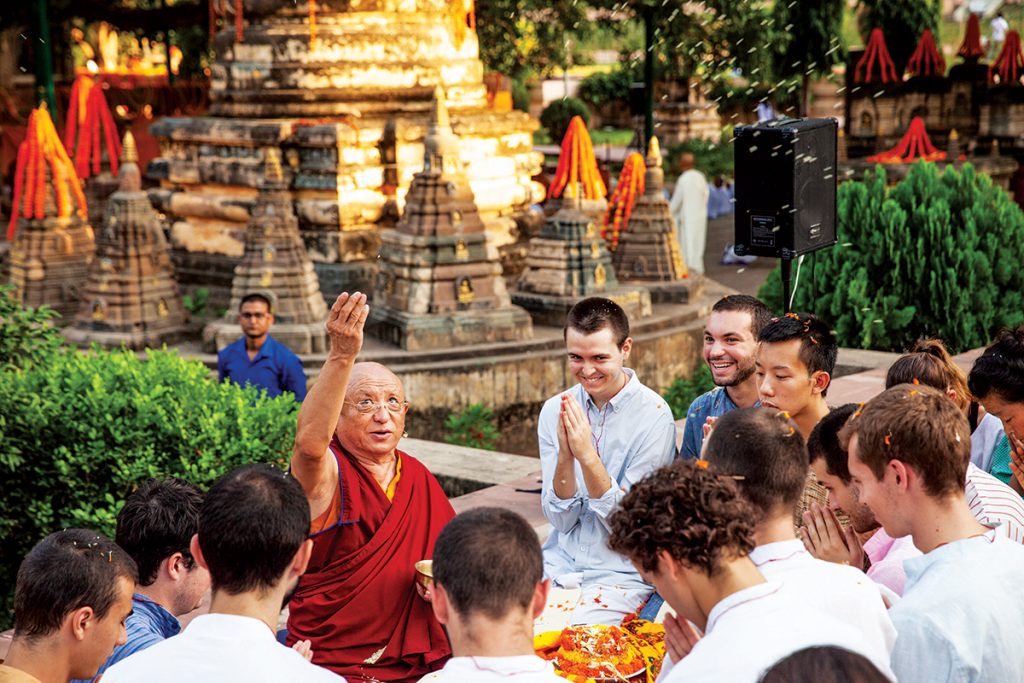Call to mind an American study-abroad program. Are you picturing daily 5:30 a.m. meditation sessions and students studying the history of Vipassana or Zen philosophy in the town of the Buddha’s enlightenment?
Probably not, but over the past four decades, the Carleton-Antioch Buddhist Studies program in Bodhgaya, India, has done just that. Through rigorous interdisciplinary courses and immersion in monastic life, the program has changed the lives of nearly one thousand alumni, many of whom are now notable figures in Western Buddhism, including dharma teachers, writers, publishers, and Buddhist scholars. Nikko Odiseos, president of Shambhala Publications, said his experience as a student in 1990 in the “diverse stew of Bodhgaya’s traditions” created a “foundation that is really hard to replicate.”
This first Buddhist study-abroad program was founded by Antioch University alums Robert Pryor and Tara Doyle in 1979. They were among the many young Westerners who had attended Anagarika Munindra and S. N. Goenka’s Vipassana retreats at the Burmese vihara (monastery) in Bodhgaya in the 1970s. Sensing a “rich learning environment” for students, Pryor and Doyle proposed an international program to Antioch’s administrators that would combine meditation instruction with academic learning. Antioch agreed, and Abbot Sayadaw U Nyaneinda soon after opened the monastery’s doors to a stream of college undergrads.
“I’m always grateful to Antioch for being willing to say, ‘Yeah, you should take students to India, live in a monastery, practice meditation, and study Buddhism. Why not?’ I’m not sure a lot of other colleges would have been so open,” Pryor said.
Related: The Bodhi Tree Express
Every fall since then, about 30 students from colleges throughout America have traveled to Bodhgaya for the semester. They ditch their laptops, follow the five precepts, mingle with pilgrims at Mahabodhi Temple, and meditate twice daily under the instruction of Vipassana, Zen, and Vajrayana teachers. Rigorous history, anthropology, philosophy, and language courses culminate in a monthlong independent study project.
Pryor retired as director at the end of the 2015 program, handing it over to Arthur McKeown, a scholar and long-time instructor at the program. In 2016, Antioch shifted its priorities away from study-abroad programs, and Carleton College in Minnesota acquired them.
This June, generations of alumni attended 40th-anniversary celebrations in Yellow Springs, Ohio, and at Rangjung Yeshe Gomde, a retreat center in Leggett, California, whose founder, Chökyi Nyima Rinpoche, is one of the program’s teachers. Looking forward, the program will retain its balance of academic study and experiential learning. Its leaders aim to increase diversity, expand scholarships, and offer students better health care in India, as well as more opportunities to interact with the Bodhgaya community. Alumni hope the program will continue for many decades to come. “If anything is worthy of resisting impermanence, it’s this program,” said Tricycle’s associate publisher Sam Mowe, a 2005 alumnus.
Thank you for subscribing to Tricycle! As a nonprofit, we depend on readers like you to keep Buddhist teachings and practices widely available.
